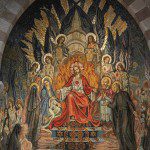Psalm 119:89-96
Your word, LORD, is eternal;
it stands firm in the heavens.
Your faithfulness continues through all generations;
you established the earth, and it endures.
On your justice stand all things,
for all things serve you.
If your law had not been my delight,
I would have perished in my affliction.
I will never forget your precepts,
for by them you have preserved my life.
Save me, for I am yours;
I have sought out your precepts.
The wicked are waiting to destroy me,
but I will ponder your statutes.
To all perfection I see a limit,
but your commands are boundless.
The verse from this section of the monster-psalm that stands out to me is verse 91: למשפטיך עמדו היום כי הכל עבדיך. Its meaning is mysteriously rich and beautiful, but the NIV totally screwed it up so I had to insert my own best translation above. The NIV said, “Your laws endure to this day.” This would work if there were no ל before the משפטיך. And if the root word were torah rather than mishpat. The presence of that preposition means that something else is standing on God’s justice(s). The verb עמדו is 3rd-person plural, so my assumption is that the הכל (all things) refers backward to the clause prior to it. So I say, “All things stand on God’s justice.” And it makes sense given the logical context since that psalmist has just written about how God “established the earth” that endures/stands (עמד, same verb).
In any case, this section of the psalm is an example of how the semantic range of English utterly fails us, at least in the reductionist use of language in modernism. Mishpat is a word that modernists either translate as justice if they’re “liberal” or judgment if they’re “conservative.” God is either only interested in social justice or in burning people in hell since everything in the Bible has to be reduced to the 20th century debate between the social gospel and fundamentalism. By the way that mishpat is used in this verse, I think it has a whole layer of untranslatable meaning that transcends our wooden modernist categories. How can all things “stand on” God’s mishpat? And what does that have to do with all things being the servants (or worshipers) of God (עבדיך)? Eved (servant) is another word that English fails to translate. As a noun, it almost always means “servant,” but when used as a verb, it can mean “worship.” I’m wondering if there is some kind of connotation of dependence, since to be somebody’s eved means that person is your patron/lord.
So my sort of wild midrashic response to this verse is to say that when we see that all things stand on God’s mishpat in the universe, we cannot help but worship Him / become His servants. God’s mishpat is so much more all-encompassing and rich than a sort of binary yes/no about whether we are admitted inside the pearly gates or a thumbs up for our “Save the whales” campaign; God holds the whole universe in His hands through the equilibrium that He is continually perpetuating. He “establishes the Earth” with/through His mishpat and that’s why “it endures.” When we’re able to think more expansively about mishpat, then we’re able to consider whether God’s “punishment” is quite simply the corrections that He makes to the disequilibrium that we cause in the universe. It may feel like “wrath” to us when we suffer the consequences of our sin, but we don’t need to think of God as being “angry.” He’s simply holding up the universe with His mishpat. We can move in sync with His mishpat or we can get stepped on and knocked over on the dance-floor over and over again (thanks to Roger Wolsey for this metaphor).
When we come to see that God’s mishpat is the source of our life, then we delight in it. We yearn to conform to it. We reinterpret everything that happens to us according to how it helps us to become a perfect servant of God / vessel of God’s love (eved YHWH, doulos christou, etc). That’s why the psalmist can say, “If your law had not been my delight, I would have perished in my affliction.” We’re going to face lots of afflictions. The question is how we will interpret them and how they will impact our spiritual journey. I want to move with the mishpat of YHWH rather than against it. That’s what I’m going to stand on.











